九年级英语unit11复习资料
九年级unit11sectionA知识点

九年级unit11sectionA知识点Unit 11 Section A Knowledge Points本文将对九年级英语Unit 11 Section A的知识点进行详细介绍和总结。
该单元主要讲解了如何询问和提供建议,并且涉及了一些常见问题和解决方法。
下面将对该单元中的重点知识点进行梳理和解析。
1. How to ask for advice(如何寻求建议)要询问别人的建议,我们可以使用以下一些常见的问句结构:- What should/could I do?- Do you have any suggestions/recommendations?- Can you give me some advice?- I'm not sure what to do. Any ideas?2. How to give advice(如何给建议)当我们被人寻求建议时,可以使用以下一些常用的表达来提出建议:- You should/could + 动词原形- Maybe you should/shouldn't + 动词原形- How about + 动词-ing?- Why don't you + 动词原形?3. Expressions of advice(建议的表达方式)以下是一些常用的表达方式来提出建议:- If I were you, I would...- I think you should/shouldn't...- In my opinion, you could...4. Common problems and solutions(常见问题与解决方法)在生活中,我们常常会碰到一些问题,下面是一些常见问题以及相应的解决方法:问题1:我无法集中注意力学习。
解决方法:你可以尝试制定学习计划,选择一个安静的学习环境,或者和同学一起学习。
问题2:我不善于表达自己的想法。
人教版九年级英语Unit11单元知识点梳理

Unit 11 Sad movies make me cry.一、短语:1.make me sleepy使我困倦2.drive sb.crazy使……发疯3.the more…,the more越……越……4.yes and no好坏参半5.be friends with sb.是某人的朋友6.feel left out感觉被忽视7.sleep badly睡眠很差8.don’t feel like eating不想吃东西9.for no reason毫无理由10.neither…nor…既不……也不……11.let…down使…...失望12.take one's position替代我的职位13.to start with起初14.get the exam result back取考试成绩单15.find out发现16.remain unhappy forever仍旧永远不幸福17.a shirt of a happy person一件快乐人的衬衫二、知识点:1.would rather意为“宁愿……”,表示句子主语的愿望、选择,后接省去to 的不定式,如He’d rather join you in the English Group.他宁愿加入到你的英语小组中来。
如果表示“宁愿(可)……也不愿……”,则用句型would rather…than…。
在would rather和than后面所连接的两个对比部分一般要一致,如The brave soldier would rather die than give in.那个勇敢的士兵宁死不屈。
2.使役动词make的用法常见于以下结构:①make+名词(代词)+省略to的动词不定式,如My parents often make me do some other homework.我父母常让我做些其他的作业。
这一结构中的不定式短语在主动结构中是宾语补足语,必须省去to,变为被动结构时,不定式短语作主语补足语,这时必须带to,如She was made to work for the night shift.她不得不上夜班。
九年级英语知识点Unit11

九年级英语知识点Unit11Unit 11: English Grammar for 9th GradersIntroduction:In 9th grade English, students will encounter various important grammar concepts that will help them enhance their understanding and usage of the English language. This unit will focus on key knowledge points that students need to grasp to improve their language skills. Below are the crucial topics covered in Unit 11:1. Verb Tenses:Verb tenses play a significant role in expressing time and indicating the sequence of events. Here, we will discuss the four main verb tenses: Present, Past, Future, and Present Perfect. Each tense has its own rules and usage, and this section will provide a thorough explanation of each tense, examples, and exercises for better understanding.2. Passive Voice:The passive voice is frequently used in English to emphasize the action or the object rather than the subject performing the action. In this section, we will explore the formation and usage of passive voicesentences, including the conversion of active voice sentences to passive voice and vice versa.3. Conditionals:Conditionals are sentences that express consequences or hypothetical situations. There are four types of conditionals: zero, first, second, and third conditional. We will delve into each conditional type, explaining the structure, usage, and providing examples to clarify how they are employed in conversations and writing.4. Reported Speech:Reported speech is used to convey someone else's words in indirect form. In this section, we will focus on transforming direct speech into reported speech, including changes in verb tenses, pronouns, and time expressions. Extensive examples and exercises will help students practice and master this important skill.5. Modals:Modals are auxiliary verbs used to express various meanings such as ability, possibility, necessity, and permission. This section will discuss the different modals, their usage, and how they can be appliedin different contexts. Students will also have the opportunity to practice using modals in sentences to solidify their understanding.6. Question Forms and Tags:Asking questions and using question tags are essential skills for effective communication. This section will cover different question forms (Wh-questions, Yes/No questions, and alternative questions) as well as question tags. Students will learn how to correctly construct questions and tags, using appropriate word order and intonation.Conclusion:Unit 11 of the 9th-grade English curriculum covers crucial grammar knowledge points to strengthen students' understanding and application of the English language. Mastery of these concepts will enhance their overall proficiency and enable them to communicate effectively in both spoken and written English. It is important for students to practice these grammar skills regularly and seek further guidance when needed to solidify their knowledge.。
Unit11笔记人教版英语九年级全册

Unit 11 知识梳理总结【词汇梳理】drive(v.迫使)→ drove(过去式)→driven(过去分词)→drive sb. crazy/mad使某人发疯/发狂friend(n.朋友)→friendly(adj.友好的)→friendship(n.友谊;友情)bank(n.银行;岸)→banker(n.银行家)examine(v.检查;检验)→examination(n.考试)wealth(n.财富)→wealthy(adj.富有的)weigh(v.称重)→weight(n.重量;分量)pull(v.拉;拖)→push(v.推)power(n.权利;力量)→powerful(adj.有权势的;有影响力的)wealth(n.财富)→wealthy(adj.富裕的)→be wealthy in在......方面富有nod(v.点头)→nodding(现在分词)→nodded(过去分词)agree(v.同意;看法或意见一致)→ agreement(n.)→ disagree(v.反义词:不同意)→ in agreement意见一致disappoint(v.使失望)→ disappointed (adj.失望的)→ disappointing(adj. 令人失望的)→ fort (v.使舒服)→ fortable (adj.使人舒服的)→ fortably (adv. 使人舒服地)→ unfortable (adj.不舒服的)【短语归纳】would rather宁愿the more... the more... 越......就越......have...in mon 有......共同之处leave out忽略,不包括feel like doing sth. 想要做某事call in召来;叫来take one’s position 取代某人的位置hand back归还search for搜寻;查找let...down使......失望kick sb. off开除某人be hard on sb. 对某人苛刻;对某人要求严格pull together齐心协力,通力合作rather than而不是start with=begin with以......开始clean up清扫干净【考点总结】1.I’d rather go to Blue Ocean because I like to listen to quiet music while I’m eating.(该句中,because引导原因状语从句,从句中又包含了一个while引导的时间状语从句)①would rather (not)do sth. 宁愿(不)做某事e.g. I would rather listen to classical music.②would rather do sth. than do sth.=would do sth. rather than do sth.=prefer to do sth. rather than do sth.e.g. I would rather stay at home than go out.=I would stay at home rather than go out.=I prefer to stay at home than go out.2.while conj.当......的时候e.g. While my father was reading a book, my mother was cooking.She was playing the piano when Mary left.3.But that music makes me sleepy.4.so...that... 如此......以至于......e.g. The little boy is so scared that he can’t say anything.He is such a friendly teacher that every student like him.【注1】(高频考点)too...to...意为“太......而不能....”(too+adj./adv.+ to + v.),常与so...that...句型(so++adj./adv +that句子)互换。
人教版九年级英语全册Unit11短语+ 单词默写

Unit 11 Sad movies make me cry.1.make sb do sth 使某人做某事sb be made to do sth某人被迫使做某事make sb +adj 使某人….Eg. make sb uncomfortable/nervous/sleepy2.feel sleepy 感到昏昏欲睡的feel-felt-feltfall asleep 睡着,入睡fall-fell-fallen3.would rather (not) do sth宁愿(不)做某事would rather do… than do…prefer to do…rather than do…prefer doing…to doing …宁愿做某事而不愿做某事prefer-preferredprefer A to B A与B相比更喜欢A3.drive sb crazy/mad使某人发疯/发狂drive-drove-driven4.so +adj/adv +that如此,以至于such +a/an+adj+n +that如此以至于too…to 太而不能not …enough to do sth 不够…5.have fun (doing) sth玩的开心=have a great/good time=enjoy oneself6.be sure (to do sth ) 确信7.what happened to sb某人发生了什么事take place 发生,举办,举行(无被动)8.the +比较级,the +比较级越来…越much 修饰比较级9. have a lot in common有许多共同之处have nothing in common没有共同之处10 sb spend some time with sb和某人一起度过时光sb spend ..in doing sth /on sth spend-spent-spentIt takes sb some time to do sth take-took-takenpay for 支付pay-paid-paidcost 主语物cost-cost-cost11. What’s wrong? =what the matter?怎么了12. be friends with sb 成为某人的朋友13Why don’t you do sth =why not do sth为什么不做某事14. join sb/the army加入某人/入党(加入并成为其中一员)join in 加入小规模活动take part in 参加并发挥一定作用15. leave out 忽略,不提及,不包括feel left out感觉被忽略16. once upon a time 从前17. feel like doing sth =would like to do sth =want to do sth想要做某事feel like 感觉像,好像,似乎18. be (as) pale as chalk 像粉笔一样苍白19. be called in 被召来,被召进20. neither …nor 既不,也不(就近原则)(反义词)both…and两者都Neither 位于句首,谓单neither of us 两个都不either …or 或者…或者(就近原则)not only…but also不但而且(就近原则)21. explain sth to sb 向某人解释某事22 Although尽管(表转折,不和but连用)23. be worried about =worry about doing担心担忧24. try to take one’s position/place试图取代某人的位置25. be afraid that +句子be afraid to do sth害怕某事,害怕做某事be afraid of sth/doing sth26.be worried about being followed by others担心被他人跟踪27. top general大将军general introduction 总的介绍28. sb be told (not) to do sth 某人被告知(不)做…29. in three days’ time 在三天之内提问how soonfor+一段时间提问how long频率提问how often距离提问how far30. to start with 首先,起初31. find out 查明,弄清楚32. throw rubbish on the streets 扔垃圾在街上throw-threw-thrown33. clean up the streets 打扫,清理街道34. remain unhappy仍然不快乐(保持,停留)35. with (表伴随)without没有(介词)36. suddenly=all of a sudden 突然地37. the rest of 剩下的,剩余的38. search for 寻找,搜寻39. be about to do sth 即将做,刚要做40. even though=even if 即使41. agree with sb’s thoughts/opinions同意某人的观点keep (on) doing sth继续保持做某事continue to do sth42. walk home alone 独自走回家43. think about = consider doing sth考虑做某事44. miss scoring that goal 错过进球miss doing sth 错过做某事45. let sb down 使某人失望disappoint sb46. kick sb off 开除某人47. as soon as 一…就+句子as long as 只要48. walk through the door 走进门去through 中间穿过across 表面横穿49. another 另一的,又一的50. knock on/at the door 敲门51. let sb in 让某人进去52. be hard on sb对某人苛刻,要求严厉be strict with sb 对某人要求严格53. support each other 相互支持54. besides而且besides 除…之外(还包括)except 除…之外(不包括)55. learn how to communicate with teammates 学习如何与队友交流56. learn from mistakes从错误中吸取教训57. with courage rather than fear带着勇敢而不是害怕58. be close to doing sth 离…近59. pull together 齐心协力,通力合作60. to one’s surprise/relief令某人吃惊/欣慰的是61 nod in agreement点头同意nod- nodded-nodded62. feel lucky to do sth 做某事感到很幸运63. win /lose a competition 赢得/失去比赛compete with sb与某人竞争64. get into a fight with sb 与某人打架单词:相当,相反宁愿迫使使某人发疯,发狂越….越最近,不久前成为某人的朋友忽略,不提及,不包括友谊,友情国王,君主权利,力量首要的,基本的大臣,部长首相,大臣银行家名声,声誉苍白的,灰白的王后,女王召来,叫来仔细的检查,检验也不既不…也不王宫,宫殿财富起初,开始时阴沉的,昏暗的,灰色的柠檬使人不舒服的,令人不舒适的重量,分量肩膀,肩球门,射门,目标使失望教练,私人教师踢,踹开除某人对某人苛刻,严厉而且同队队员,队友勇敢,勇气而不是家伙拉,拖齐心协力,通力合作轻松,解脱点头(意见或看法)一致,同意过失,缺点使失望。
九年级英语全册unit11知识点

九年级英语全册unit11知识点九年级英语全册Unit 11知识点Unit 11 is an important unit in the ninth-grade English textbook. It covers a wide range of topics and introduces various grammatical structures and vocabulary. In this article, we will explore some of the key points in Unit 11.1. Vocabulary Expansion:Unit 11 introduces new vocabulary related to travel and transportation. Students will learn words such as "destination," "journey," "traffic jam," and "arrive," among others. This vocabulary will enable students to better express themselves when discussing travel experiences or planning trips.2. Verb Patterns:Unit 11 emphasizes verb patterns, including infinitives, gerunds, and base verbs. Students will practice using these patterns in different contexts, such as "I plan to visit Beijing," "I enjoy swimming," and "I like playing basketball." Understanding verb patterns is crucial for constructing grammatically correct sentences and expressing ideas accurately.3. Modal Verbs:Modal verbs play a significant role in Unit 11. Students will learn how to use modal verbs such as "can," "could," "may," and "might" to express abilities, possibilities, and permission. For example, students will practice using sentences like "I can swim," "I could finish the project," and "May I go to the restroom?" Mastering modal verbs is essential for effective communication in English.4. Conditional Sentences:Unit 11 introduces different types of conditional sentences, including zero, first, and second conditional. Students will learn how to form these sentences and use them to express hypothetical situations and their possible outcomes. For example, students will practice constructing sentences like "If it rains, we will stay indoors" or "If I had time, I would visit my grandparents."5. Reading Comprehension:Unit 11 includes various reading passages that allow students to enhance their reading comprehension skills. The passages cover topics related to travel and exploration, providing opportunities for students to improve their understanding of the English language while learning new vocabulary and grammatical structures.6. Writing Practice:Students in Unit 11 will engage in writing exercises that focus on descriptive writing, narrative writing, and expressing opinions. These activities will help students develop their writing skills and enable them to convey their thoughts and ideas effectively in written form.7. Listening Practice:Unit 11 offers a range of listening activities that allow students to improve their listening comprehension skills. Students will listen to dialogues, conversations, and monologues related to travel experiences, transportation, and cultural exploration. These activities enhance students' ability to understand spoken English and familiarize them with different accents and speech patterns.In conclusion, Unit 11 of the ninth-grade English textbook covers a diverse range of topics and essential language skills. From vocabulary expansion and verb patterns to modal verbs, conditional sentences, reading comprehension, writing practice, and listening exercises, this unit provides students with extensive opportunities to enhance their English language proficiency. By actively engaging in the lessons and completing the exercises, students will develop a solid foundation inEnglish that will serve them well in their future language learning endeavors.。
九年级英语全册Unit11Sadmoviesmakemecry重点知识点大全(带答案)

九年级英语全册Unit11Sadmoviesmakemecry重点知识点大全单选题1、I tried two bookshops for the dictionary I wanted, but ________of them had it. A.eitherB.bothC.neitherD.none答案:C句意:为了这本词典,我找了两家书店,但是他们哪一家都没有。
考查不定代词。
either两者中任何一个都;both两者都;neither两者中任何一个都不;none一个也没有,指三者或三者以上。
根据前半句可知下文指的是两家书店都没有这本词典。
故选C。
2、The English Speech Competition the best in her. As a result, she is more active now.A.checked outB.tried outC.left outD.brought out答案:D句意:英语演讲比赛激发出她的潜能(使她表现出她最好的一面)。
结果,她现在更活跃了。
A. checked out 核实,查实;B. tried out试验,测验;C. left out排除,不包括;D. brought out使显现,使表现出。
bring out the best in somebody意为“把某人最好的一面表现或显露出来”。
故答案为D。
3、— Come and see! The baby is crying.—Please do something to make him .A.stop cryingB.stop to cryC.cryingD.cry答案:A句意:——过来看看!婴儿在哭。
——做点什么让他别哭了。
A. stop crying 停止哭;B. stop to cry停下来去哭;C. crying动名词;D. cry动词原形。
make sb . do sth. 使某人做某事,make后跟动词原形,排除C;还考查了stop的用法。
九年级英语unit11知识点梳理
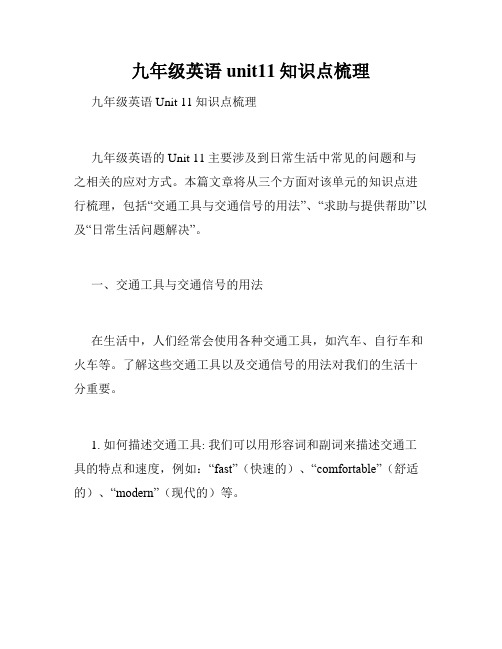
九年级英语unit11知识点梳理九年级英语Unit 11知识点梳理九年级英语的Unit 11主要涉及到日常生活中常见的问题和与之相关的应对方式。
本篇文章将从三个方面对该单元的知识点进行梳理,包括“交通工具与交通信号的用法”、“求助与提供帮助”以及“日常生活问题解决”。
一、交通工具与交通信号的用法在生活中,人们经常会使用各种交通工具,如汽车、自行车和火车等。
了解这些交通工具以及交通信号的用法对我们的生活十分重要。
1. 如何描述交通工具: 我们可以用形容词和副词来描述交通工具的特点和速度,例如:“fast”(快速的)、“comfortable”(舒适的)、“modern”(现代的)等。
2. 交通信号的用法: 交通信号是保障交通安全的重要手段。
我们需要了解交通信号的颜色及其对应的含义,例如红灯代表停,绿灯代表行,黄灯代表准备停车等。
3. 交通工具的使用场景: 不同的交通工具适合不同的场合。
我们需要了解何时应该坐公共汽车、什么时候应该骑自行车以及什么时候应该选择步行。
二、求助与提供帮助在生活中,我们难免会遇到各种问题,有时我们需要向他人求助,有时则需要提供帮助。
因此,学习如何准确地表达求助和提供帮助的需求是非常重要的。
1. 求助的方式: 当我们遇到问题时,可以采用不同的方式向他人寻求帮助,如“Could you please help me?”(你能帮助我吗?)、“Excuse me, can you give me a hand?”(打扰一下,你能帮我一下吗?)等。
2. 提供帮助的方式: 当我们看到他人需要帮助时,可以主动地提供援助,如“Can I help you?”(我能帮你吗?)、“Let me give you a hand!”(让我帮你一下!)等。
3. 礼貌用语的使用: 在求助和提供帮助的过程中,我们要注意礼貌用语的使用,如“thank you”(谢谢你)和“you're welcome”(不客气)等,这样可以提升交流的效果。
九年级英语全册Unit11Sadmoviesmakemecry笔记重点大全(带答案)

九年级英语全册Unit11Sadmoviesmakemecry笔记重点大全单选题1、Helping others makes us veryA.lonely .B.proud .C.lazy .D.harmful答案:B句意:帮助别人使我们非常自豪。
考查形容词的辨析。
A. lonely寂寞的;B. proud 自豪;C. lazy懒惰;D. harmful有害的。
表示“自豪的”应用proud。
故选B。
2、—Don't worry, Mom. The doctor said it was only the flu.—______ I'll tell Dad there's nothing serious.A.What a reliefB.Congratulations!C.What for?D.I'm sorry to hear that答案:A句意:——妈妈别担心,医生说那只是流感。
——太好了。
我告诉爸爸没什么大不了的。
考查情景交际。
What a relief 终于解脱了;Congratulations 恭喜你;What for 为什么;I'm sorry to hear that 听到这个消息我很抱歉。
根据 it was only the flu.意为“只是流感”,可知妈妈一下子放松下来。
故选A。
3、 __________ we work at English, the better grades we will get.A.HarderB.The hardestC.HardestD.The harder答案:D试题分析:句意:我们越努力学习英语,我们将获得越好的分数。
the+比较级+主语+谓语+其他,the+比较级+主语+谓语+其他。
表示“越……越……”。
hard的比较级形式是harder,结合句意及结构,故选D。
4、— Is Jack in the next room?— Well, it’s hard to say. But I heard him _____ loudly when I passed by just now .A.speakB.to speakC.speakingD.spoke答案:C句意:——杰克在隔壁吗?——嗯,很难说。
Unit 11 重点知识点默写 人教版英语九年级全册

九年级全册Unit 11 重点知识点默写重点词汇:1. late --- __________(adv.)2. power --- __________(adj.)3. bank --- __________(n.)4. famous --- __________(n.)5. examine --- __________(n.)6. wealth --- __________(adj.)7. comfortable --- __________(反义词) 8. weigh --- __________(n.)9. encourage --- __________(n.) 勇气10. relief --- __________(v.)11. nod --- __________(现在分词) 12. agree --- __________(n.)13. false --- __________(n.) 14. disappoint --- __________/ __________(adj.) 重点短语:1. 让某人做某事________________2. 宁愿做某事________________3. 使某人发疯________________4. 如此...以至于... ________________5. 越...就越... ________________6. 有...相同之处________________7. 成为某人的朋友________________ 8. 忽略;不提及________________9. 感觉像;想要________________ 10. 召集________________11. 既不...也不... ________________ 12. 起初,开始时________________13. 发放________________ 14. 寻找,搜寻________________15. 即使________________ 16. 盯着________________17. 让某人失望________________ 18. 开除某人________________19. 对某人苛刻________________ 20. 而不是________________21. 齐心协力________________ 22. 让某人感到轻松的是________________ 23. 一致地________________重点句型:1. 轻柔的音乐使Amy很放松,但却使Tina很瞌睡。
人教版九年级英语全册Unit11复习课件

玩转词组
• 11 开除某人
11kick sb. off / ask sb. to leave
• 12 对某人苛刻 12 be hard on sb./put too much
• 13 而不是
pressure on sb.
• 14 齐心协力
13 rather than
• 15 看法一致
14 pull together/work hard together
4. 不要对朋友太苛刻。 Don’t _b_e_to_o__h_ar_d_o_n_ your friends.
5. 我们必须齐心协力,否则会失败。 We must _pu_l_l _to_g_e_th_e_r, or we’ll fail.
玩转知识点
1.be supposed to do:应该做某事 be expected to do:被期待做某事 相当于情态动词should。如:
15.敲,击 __k_n_o_c__k___ 16.除了__e_x_c_e_p_t____
玩转词组
• 1宁愿做某事 • 2使某人发疯/发狂 • 3越…越… • 4成为某人的朋友 • 5忽略 • 6首相 • 7召来 • 8既不…也不… • 9起初 • 10使某人失望
• 1 would rather do • 2 drive sb. mad/ crazy • 3 The more… , the more… . • 4 be friends with sb. • 5 leave out • 6 Prime Minister • 7 call in • 8 neither… nor.. • 9 To start with 10 let sb. down/ disappoint sb.
九年级英语第十一单元重要考点归纳(整理打印版)
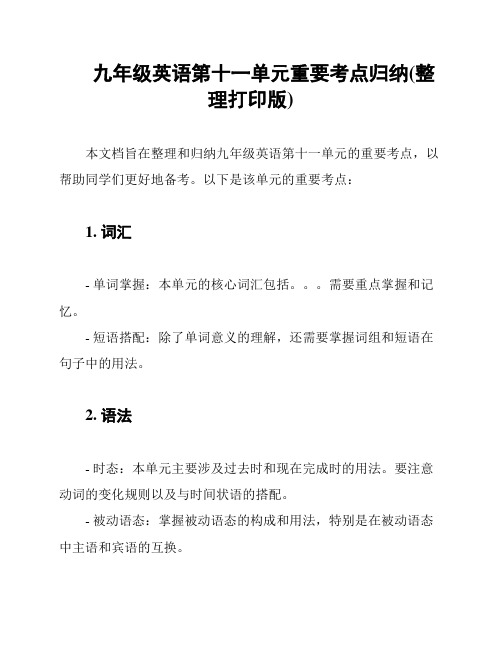
九年级英语第十一单元重要考点归纳(整
理打印版)
本文档旨在整理和归纳九年级英语第十一单元的重要考点,以帮助同学们更好地备考。
以下是该单元的重要考点:
1. 词汇
- 单词掌握:本单元的核心词汇包括。
需要重点掌握和记忆。
- 短语搭配:除了单词意义的理解,还需要掌握词组和短语在句子中的用法。
2. 语法
- 时态:本单元主要涉及过去时和现在完成时的用法。
要注意动词的变化规则以及与时间状语的搭配。
- 被动语态:掌握被动语态的构成和用法,特别是在被动语态中主语和宾语的互换。
3. 阅读理解
- 理解文章大意:通过快速阅读确定文章的主题和大意,了解每段的主要信息。
- 找出关键细节:识别文章中的关键信息,如时间、地点、人物等,以便更好地回答问题。
- 推测词义:通过上下文推测生词或不熟悉的词语的意思。
4. 写作
- 作文结构:了解作文的基本结构,包括开头、写作目的、主体段落以及结尾部分。
- 表达观点:在写作中要清晰地表达自己的观点,并给出充分的理由和支持。
- 使用连接词:使用连接词和过渡词组来组织文章并展示逻辑关系。
5. 口语
- 情景对话:熟悉日常对话中常用的表达方式和句型结构。
- 面试技巧:研究如何回答面试问题,在回答时要表达清晰、有条理,给出具体的例子。
以上就是九年级英语第十一单元的重要考点归纳。
同学们在备考过程中要注重词汇和语法的研究,提高阅读理解和写作能力,并积极参与口语练。
祝大家取得好成绩!。
人教版九年级英语Unit11知识点梳理及语法讲义(教师版)
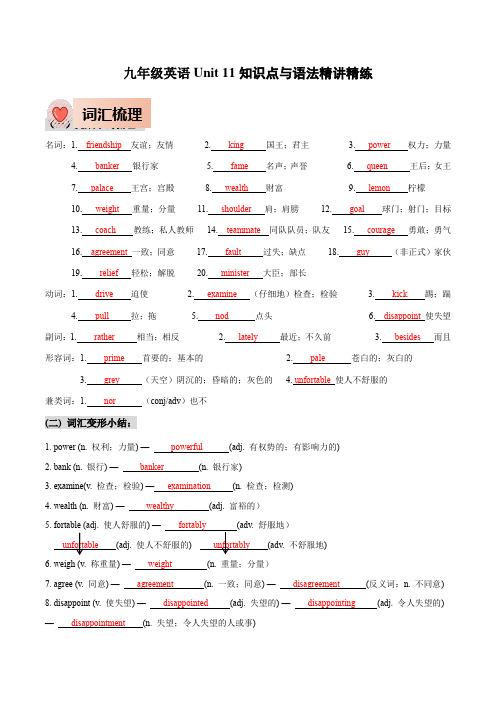
九年级英语Unit 11知识点与语法精讲精练词汇梳理(一)完成单词梳理:名词:1. friendship友谊;友情 2. king 国王;君主 3. power 权力;力量4. banker 银行家5. fame 名声;声誉6. queen 王后;女王7. palace 王宫;宫殿8. wealth 财富9. lemon 柠檬10. weight 重量;分量11. shoulder 肩;肩膀12. goal 球门;射门;目标13. coach 教练;私人教师14. teammate 同队队员;队友15. courage 勇敢;勇气16. agreement 一致;同意17. fault 过失;缺点18. guy (非正式)家伙19. relief 轻松;解脱20. minister 大臣;部长动词:1. drive 迫使 2. examine (仔细地)检查;检验 3. kick 踢;踹4. pull 拉;拖5. nod 点头6. disappoint 使失望副词:1. rather 相当;相反 2. lately 最近;不久前 3. besides 而且形容词:1. prime 首要的;基本的 2. pale 苍白的;灰白的3. grey (天空)阴沉的;昏暗的;灰色的4. unfortable 使人不舒服的兼类词:1. nor (conj/adv)也不(二) 词汇变形小结:1. power (n. 权利;力量) — powerful (adj. 有权势的;有影响力的)2. bank (n. 银行) — banker (n. 银行家)3. examine(v. 检查;检验) — examination (n. 检查;检测)4. wealth (n. 财富) — wealthy (adj. 富裕的)5. fortable (adj. 使人舒服的) — fortably (adv. 舒服地)unfortable (adj. 使人不舒服的) unfortably (adv. 不舒服地)6. weigh (v. 称重量) — weight (n. 重量;分量)7. agree (v. 同意) — agreement (n. 一致;同意) — disagreement (反义词:n. 不同意)8. disappoint (v. 使失望) — disappointed (adj. 失望的) — disappointing (adj. 令人失望的) — disappointment (n. 失望;令人失望的人或事)9. late (adj. 晚的;迟的) — lately (adv. 最近;不久前) 【练一练】用所给词的适当形式填空 1. He used to be a __powerful ___( power) prime minister. 2. Roy loves soft music. Too loud music makes him _unfortable _( fortable).3. _Friendship ___( friend) between you and me is more important to me than anything else.4. I have made Alice mad and I'm not sure what ___to do ____(do) about it.5. Happiness is more important than___wealth ____( wealthy).6. The girl didn’t want to go across the small bridge. She was afraid of ___falling ____(fall) into the river.7. The policeman __examined ___(examine) the tea to see whether or not it caused the woman’s death.8. I hope my son will be a ___banker ____(bank) in the future.9. What he said yesterday___drove _____( drive) me mad.10. Mike didn't receive his daughter' s letters ___lately _____(late).(三) 短语攻关:would rather 宁愿 drive sb. crazy/mad 使人发疯/发狂 the more...the more...越……越…… be friend with sb. 成为某人的朋友 leave out忽略;提及;不包括 prime minister 首相;大臣 call in 召来;叫来 neither...nor... 既不……也不……to start with 起初;开始时let...down 使失望 kick sb. off 开除某人 be hard on sb. 对某人苛刻rather than 而不是 pull together 齐心协力;通力合作 put pressure on sb. 向某人施加压力 get to know sb./sth. 渐渐了解某人/某事 be close to (在时间、空间上)接近 would rather do sth. 宁愿做某事1.I’d rather go to Blue Ocean because I like to listen to quiet music while I’m eating. 我愿意去蓝色海洋(餐馆),因为我喜欢在吃饭时听安静的音乐。
九年级英语全册Unit11Sadmoviesmakemecry考点总结(带答案)

九年级英语全册Unit11Sadmoviesmakemecry考点总结单选题1、—Did you study any other languages English when you were at college?—Yes, I studied three. But I have forgotten all a few words of each.A.besides; besidesB.but; exceptC.except; exceptD.besides; except答案:D试题分析:——除去英语之外,你在大学里还学了其他外语了吗?——是的,我学了3种。
但除去几个单词外,我都忘记了。
Besides意为“除------之外(包括在内)”,常与other,another,any other,else等连用;except意为“除------之外(不包括在内)”,指从整体中除去except所带的人或物,常与all,any,every,no以及其他复合词连用。
故选D。
2、—I do feel a little about making a speech.—Take it easy. The more you prepare, the better you will feel A.angryB.disappointedC.nervousD.bored答案:C句意:-对于做演讲我的确感到有点紧张。
-放松点,你准备的越多,你感觉就好越好。
angry生气的;disappointed失望的;nervous紧张的;bored厌烦的。
根据下面的答语中Take it easy可知,这是安慰对话的一句话,说明对方非常的紧张,故应选C。
3、We feel like____some food and drink because we'll invite some friends____in a party.A.buying;to joinB.to buy;joiningC.buying;join答案:A句意:我们想买一些食物和饮料因为我们将邀请一些朋友参加聚会。
人教九年级英语11知识点
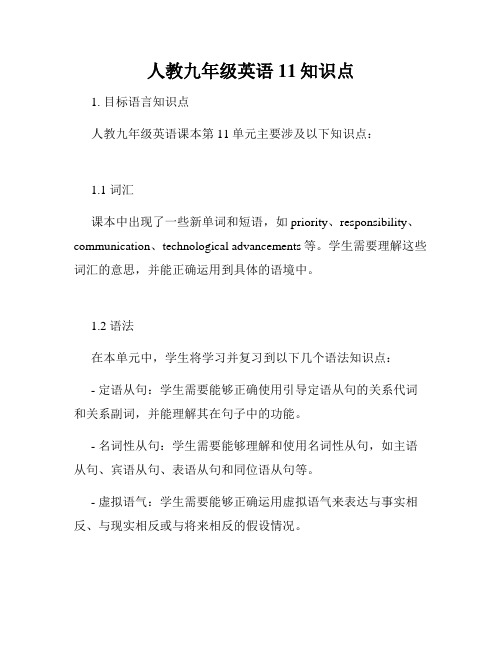
人教九年级英语11知识点1. 目标语言知识点人教九年级英语课本第11单元主要涉及以下知识点:1.1 词汇课本中出现了一些新单词和短语,如priority、responsibility、communication、technological advancements等。
学生需要理解这些词汇的意思,并能正确运用到具体的语境中。
1.2 语法在本单元中,学生将学习并复习到以下几个语法知识点:- 定语从句:学生需要能够正确使用引导定语从句的关系代词和关系副词,并能理解其在句子中的功能。
- 名词性从句:学生需要能够理解和使用名词性从句,如主语从句、宾语从句、表语从句和同位语从句等。
- 虚拟语气:学生需要能够正确运用虚拟语气来表达与事实相反、与现实相反或与将来相反的假设情况。
- 过去分词作定语和状语:学生需要能够正确运用过去分词作定语和状语,包括过去分词作前置定语和过去分词作状语表示原因、条件、时间等。
1.3 阅读理解本单元的阅读理解篇章主要涉及生活中的各种话题,如家庭关系、环境保护、社会问题等。
学生需要通过阅读理解篇章,能够获取关键信息,理解文章的大意和细节,并能回答相关问题。
2. 教学建议为了学生能够更好地掌握本单元的知识点,教师可以采用以下教学建议:2.1 创设语境在教学过程中,教师可以创设各种生活场景,使学生能够在实际语境中学习和应用所学的知识点。
比如,通过小组合作的形式,让学生模拟讨论环境保护问题,并用定语从句和名词性从句来描述和表达自己的观点。
2.2 提供示例句子教师可以提供一些典型的例句,让学生能够观察和分析句子中所使用的语法结构和词汇,在理解的基础上,进行灵活运用。
比如,教师可以给出一些句子,要求学生根据上下文选择正确的关系代词来完成定语从句。
2.3 多样化练习形式教师可以设计一些丰富多样的练习形式,如填空、改错、翻译等,来帮助学生巩固所学的知识点。
同时,可以设置一些拓展性练习,提供更多的练习机会,让学生在实际运用中加深对知识的理解和掌握。
人教版九年级英语unit11知识点归纳
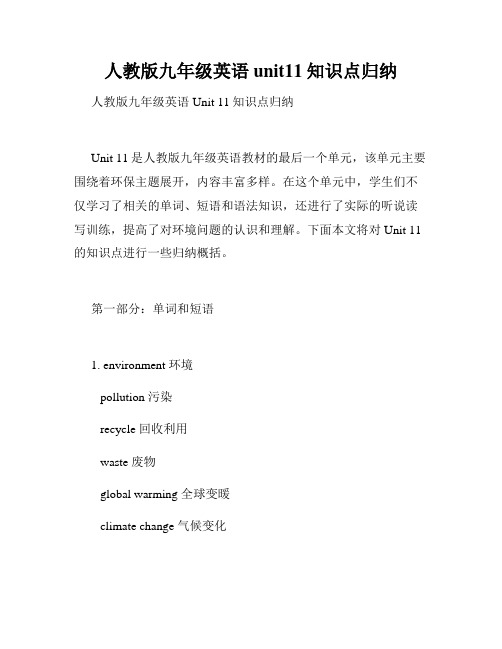
人教版九年级英语unit11知识点归纳人教版九年级英语Unit 11知识点归纳Unit 11是人教版九年级英语教材的最后一个单元,该单元主要围绕着环保主题展开,内容丰富多样。
在这个单元中,学生们不仅学习了相关的单词、短语和语法知识,还进行了实际的听说读写训练,提高了对环境问题的认识和理解。
下面本文将对Unit 11的知识点进行一些归纳概括。
第一部分:单词和短语1. environment 环境pollution 污染recycle 回收利用waste 废物global warming 全球变暖climate change 气候变化这些单词和短语是本单元的核心内容,学生们要学会运用它们来描述和谈论环境问题。
2. rubbish 垃圾plastic bags 塑料袋energy-saving 节能的power station 发电站endangered species 濒危物种这些单词和短语是围绕环境问题展开的,学生们需要了解并掌握它们的意思和用法。
第二部分:语法1. 一般现在时一般现在时用于表达经常性的动作、习惯或客观真理。
例如:Water boils at 100 degrees Celsius.2. 一般过去时一般过去时用于表示过去发生的事情或已经结束的状态。
例如:I visited my grandparents last summer.3. 被动语态被动语态用于强调动作的承受者而不是执行者。
例如:The book was written by a famous author.学生们需要注意动词的时态和被动语态的变化规则,以便正确地运用它们。
第三部分:听说读写1. 听力训练听力训练包括听对话和短文以及回答相关问题。
学生们需要通过听力训练提高听力理解能力和获取信息的能力。
2. 口语表达口语表达包括通过对话和演讲等形式,进行实际的口头交流。
学生们需要勇于开口,积极参与口语练习,提高口语表达和交流能力。
九年级11单元英语知识点
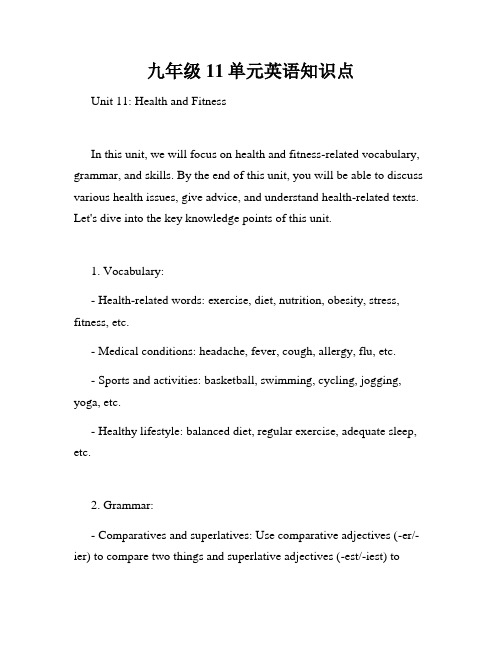
九年级11单元英语知识点Unit 11: Health and FitnessIn this unit, we will focus on health and fitness-related vocabulary, grammar, and skills. By the end of this unit, you will be able to discuss various health issues, give advice, and understand health-related texts. Let's dive into the key knowledge points of this unit.1. Vocabulary:- Health-related words: exercise, diet, nutrition, obesity, stress, fitness, etc.- Medical conditions: headache, fever, cough, allergy, flu, etc.- Sports and activities: basketball, swimming, cycling, jogging, yoga, etc.- Healthy lifestyle: balanced diet, regular exercise, adequate sleep, etc.2. Grammar:- Comparatives and superlatives: Use comparative adjectives (-er/-ier) to compare two things and superlative adjectives (-est/-iest) tocompare more than two things. For example, "He is taller than his brother. She is the tallest in their class."- Modals: Using modals such as "should," "ought to," and "must" to give advice or make suggestions. For example, "You should eat more vegetables for a healthier lifestyle."- Passive voice: Forming passive sentences to emphasize the actions or objects rather than the doer. For example, "The book was written by Mark Twain."3. Reading and Listening Skills:- Skimming: Quickly going through a text to get a general understanding of its main ideas.- Scanning: Searching for specific information in a text by looking at keywords or phrases.- Inference: Drawing conclusions based on the information provided in a text.- Predicting: Guessing what will happen next based on the context clues.4. Writing Skills:- Writing a letter of advice: Using appropriate language and structure to give advice on health-related issues.- Describing habits and routines: Talking about daily habits and routines, such as exercise and diet.- Writing a short paragraph about personal health: Describing one's own health condition and giving suggestions for improvement.Remember to practice these skills through various activities, such as reading articles, listening to podcasts, and engaging in conversations about health and fitness. The more you expose yourself to English, the more confident you will become in using these knowledge points.In conclusion, Unit 11 focuses on health and fitness-related vocabulary, grammar, and skills. By learning and practicing these key knowledge points, you will be able to discuss health issues, give advice, and comprehend health-related texts in English. Keep exploring and expanding your knowledge to become a proficient English user. Good luck!。
(完整word版)人教版九年级英语全一册Unit11知识点总结

人教版九年级英语全一册Unit11知识点总结九年级英语unit11知识点总结九年级1.SO+be动词/助动词/情态动词+主语表达前面所陈述的情况也适合另外一人,意为“某某也一样”知识点来源:A.Iˈm hungry,Amy.我饿了,艾米.B.So am I.Why don’t we get something to eat.我也饿了,我们为什么不弄点吃的东西呢?助动词举例:do,did,does,have,has...be 动词举例: am,is ,are ,was ,were...情态动词举例: can,could,may,should,must,...例句:①He goes to school every day. So do I.他每天上学,我也如此。
②He is fourteen. So am I.他十四岁,我也十四。
③He can speak English. So can I. 我也会。
对别人情况加以肯定时常用so+主语+助动词如:①The students work hard. So they do. 他们学习努力,他们确实努力。
②He is good at maths. So he is.(他善长数学,他确实善长数学。
)练习①I went to the movies yesterday.______________(Dale也去了。
)②Dale’s brother is a student. _________________(我也是。
)③I have finished my homework. _________________(Dale也完成了。
)④Dale should see a doctor.______________________(Mike也应该去。
)2.why don’t you do sth =why not do sth你为什么不做某事呢?知识点来源;Why don’t we get something to eat.翻译句子:你为什么不早起呢?_____________________________________________________.我们为什么不去看电影呢?_____________________________________________.3.make的用法①make sb do sth 使某人做某事知识点来源:The soft music makes me relax.柔和的音乐让我放松。
九年级unit11知识点总结

九年级unit11知识点总结九年级Unit 11知识点总结Unit 11是九年级英语教材中的一个重要单元,主要涵盖了“Great scientists”(伟大的科学家)这一主题。
本单元主要介绍了一些知名的科学家,以及他们对科学领域做出的重大贡献。
以下是对Unit 11中重要知识点的总结。
1. Scientists' Achievements(科学家的成就)本单元介绍了几位伟大的科学家,包括 Isaac Newton, Albert Einstein 和 Marie Curie。
学生们应该了解他们的研究领域,以及他们对科学做出的具体贡献。
2. Isaac Newton and His Achievements(艾萨克·牛顿及其成就)艾萨克·牛顿是物理学的先驱,他的三大运动定律对现代科学有着深远的影响。
学生们需要了解他的运动定律的基本原理,以及它们在日常生活中的应用。
3. Albert Einstein and His Theory(阿尔伯特·爱因斯坦及其理论)阿尔伯特·爱因斯坦是相对论的创立者,被誉为现代物理学的奠基人。
学生们应该了解相对论的基本概念,如相对性原理和质能方程(E=mc²),并理解它们对物理学的重要性。
4. Marie Curie and Her Discoveries(玛丽·居里及其发现)玛丽·居里是放射性研究的开创者,也是第一个获得两次诺贝尔奖的女性科学家。
学生们应该了解她对放射性元素的研究,以及她的发现对医学和科学领域的贡献。
5. Vocabulary and Phrases(词汇和短语)学生们需要掌握本单元中出现的一些重要词汇和短语,如gravity(重力)、theory(理论)、discover(发现)等。
同时,他们也应该能够正确使用这些词汇和短语来描述科学家和他们的成就。
6. Reading Comprehension(阅读理解)通过阅读课文中的相关资料,学生们需要学会提取关键信息、理解上下文,并回答与课文内容相关的问题。
- 1、下载文档前请自行甄别文档内容的完整性,平台不提供额外的编辑、内容补充、找答案等附加服务。
- 2、"仅部分预览"的文档,不可在线预览部分如存在完整性等问题,可反馈申请退款(可完整预览的文档不适用该条件!)。
- 3、如文档侵犯您的权益,请联系客服反馈,我们会尽快为您处理(人工客服工作时间:9:00-18:30)。
Unit 11 Could you tell me where the restrooms are?学习目标1. 从句是英语中重要句式之一,仔细观察并总结其句序结构,把握宾语从句在日常生活中巧妙运用的规律。
2. 通过日常生活中礼貌问语的学习,在观察和比较中发现问题、解决问题,把英语问题与现实生活有机结合起来。
难点解析1.巧妙把握宾语从句中时态的正确使用例如(1)“The moon goes around the earth.” Miss Gao told us.(二合一)Miss Gao told us the moon _______ _______ the earth.答案为:goes around.月亮绕地球转是一个客观事实,故从句时态用一般现在时,不受主句时态的影响。
(2) “I have been to Beijing twice.” He said to us.(二合一)He _________ us ______ ______ ______ ________ Beijing twice.答案为:told; he had been to.此题从句就要变成相对应的过去时形式。
2. whether 与if用法区别(1) Let me know _________ he will come or not.(2) She asked me __________ I know whose pen it was.(3) I’m interested in ________ SARS is so terrible.(4) He hasn’t decided ________ to visit the old man.答案:(1)、(3)(4)只有whether; (2)两者均可。
典型例题1. Could you tell me how I can get to the drugstore (变为简单句)Could you tell me how _______ _______ to the drugstore?解析:疑问词引导的宾语从句可以转化为疑问+不定式的简单句形式。
故答案为:to get。
2. Are you afraid of Bird Flu? l asked the students.(二合一)I asked the students______ _______ _______ afraid of Bird Flu.解析:答案为whether/if they were。
此题应注意两点:(1)当宾语从句由一般疑问句变化而来时,用if或whether来引导;(2)当主句时态为一般过去时时,宾语从句须用相对应的过去的某一种时态。
3.I don't know if the students_______ (go)to the mall after supper. If they_________ (go)there, please tell me.解析:答案为will go;goes。
第一个句子是if引导的宾语从句,有将来的意义,后一个句子为if引导的条件状语从句,须用一般现在时。
单元练习I.根据题意及首宇母提示填空1.—Computers are useful inventions and becoming more and more popular.——Yeah.But I think everything has its a_______ and d_________.2. At that time the British pound e_______ for $ 1.80.3. It’s good for our health to breathe f________ air.4. The t________ of this evening party is r________.5. The young boy's mother often tells him to be a b_________ man.6.We should train a p________ force to defend our country.II.句型转换1. The Smiths said they would visit Beijing next year,_________ _________? (完成反意疑问句)2. I wonder how I can make myself better. (改为同义句)I wonder how_________ _________ myself better.3. He said, "I'll be free next Tuesday afternoon. "(改为宾语从句)He said that ________ ________ _______ _________ the next Tuesday afternoon.4. I think. He isn't a bad boy. (合并为一句)I_______ think that he________ a bad boy.5. How can I search the Internet? Could you tell me? (合并为一句)Could you tell me_______ ________ ________ search the Internet?Could you tell me________ _______search the Internet?III.完形填空Computers are 1 machines. They can help people a lot in their daily life. For example, they can help people to 2 much time to do much work, and they can help people to work out many 3 they can not do easily. Our country asks everyone to know how to 4 computers before the twenty-first century, except the old people.Today more and more 5 own computers. Parents buy computers for their 6 . They hope computers can help them improve their 7 in school. Yet, many of their children use computers to play 8 ,to watch video, or to sing Karaoke instead of studying. So many teachers and parents complain that computers can't help children to study but make them 9 . The complains lead to computers being locked in boxes.In some other countries, even some scientists also hate computers. They say computers let millions of people lose jobs or bring them a lot of trouble. Will computers 10 bring troubles to people or can they bring people happiness? It will be decided by today's students.1 A. use B. useful C. quietly D. hard2 A. spend B. save C. lost D. take3 A. questions B. problems C. ideas D. mind4 A. make B. use C. watch D. mend5 A. family B. families C. fathers D. mothers6 A. sons B. daughters C. children D. grandsons7 A. studies B. playing C. subjects D. writing8 A. football B. games C. basketball D. volleyball9 A. fall into B. fall behind C. fall ill D. fall over10 A. quick B. real C. really D. fastestIV.阅读理解One day Mark Twain was asked whether he could remember the first money he made.He thought a while before answering, and then said, "Yes, I remember everything about it. It was at school. The pupil in those days never respected their teachers and never took care of the things of the school. They often broke the window glasses. There was a rule that any boy who broke the glass would be beaten in front of the whole school, or have to pay five dollars. ""One afternoon I was playing football, when suddenly my ball hit the window. I ran over and found its glass broken into pieces. I could do nothing but tell my father I had made the mistake, and that I should pay the money or be beaten before the whole school. My father said it would be too bad to have our family lose face in front of the public. He agreed to give me money in order to hand it over to the headmaster. But before giving me money, he took me upstairs and gave me a good beating.But having had one beating and got used to it, I decided I would accept another beating at school and keep the five dollars. So that's what I did. That was the first money I ever made. "阅读短文并根据其内容判断正(T)误(F)1 Mark Twain could remember the first money he made.2 The pupils in those days respected their teachers.3 After Mark Twain's football broke the window glass, he decided to tell his father about it.4 His father didn't agree to give him money to pay for the window glass.5 Mark Twain kept the five dollars but got another beating at school at last.V.书面表达你校(十四中学)在星期五下午3:30安排了滨海大学的外籍教授Mr.Smith作题为《Task based Learning》的英语讲座。
